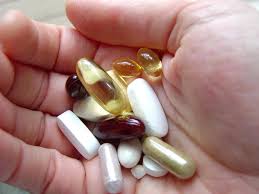Learn about brain health and nootropics to boost brain function
Jump-start your brain


The brain is a complex organ that requires various nutrients to operate efficiently. While there are a lot of factors necessary to keep the body running, it also helps to be familiar with the important ones that keep your brain running.
- Thiamin (B1) is necessary for brain function. Thiamin, and other B class vitamins are a group of water-soluble vitamins that help cells convert carbohydrates into energy for the brain and nervous system. Thiamin also helps with muscle contraction and conduction of nerve signals. When consuming thiamin, consider foods such as salmon, pork, flax seeds, navy beans, green peas, tofu, brown rice and asparagus. A healthy amount would be 1.2 mg per day.
- Folic acid (B9) is another B vitamin beneficial for the brain. B9, along with B6 and B12 can reduce levels of the amino acid Homocysteine, which has been linked to strokes, artery disease and dementia. While B9, along with B6 and B12 have not been shown to improve cognitive function, they can help with protecting against future diseases. Folic acid can be found in beans, citrus, leafy greens and rice. A daily dose for folic acid should be 400 micrograms per day for people 14 and up. However, women who are pregnant should consider 400-800 micrograms as the excess folic acid can help with the extra blood needed for pregnancy.
- Ascorbic Acid (Vitamin C) is a natural antioxidant molecule that exists within the brain. Vitamin C is beneficial for brain receptors, which are key to protect against Alzheimer’s, Parkinson’s and Huntington’s disease. Ascorbic acid is found in peppers, guava, kale and broccoli. The daily dose for Vitamin C is 90 mg. Given the fact that Vitamin C is also an antioxidant, you may also benefit from the effects of healthier skin and a robust immune system. Ascorbic acid is found in peppers, guava, kale and broccoli. The daily dose for Vitamin C is 90 mg. Given the fact that Vitamin C is also an antioxidant, you may also benefit from the effects of healthier skin and a robust immune system.
- Calcium is a vitamin that works with ascorbic acid. Calcium helps to regulate neurotransmitter synthesis/release and neuronal excitability. Calcium has been shown to have an active role in memory as studies have been shown that alterations in neuron function in aging brains could potentially be due to changes in calcium levels. Calcium can be found in seeds, cheese, yogurt, salmon and almonds. The daily dose for this vitamin is 1,000 mg. Also, calcium can be vital to both muscle and nerve health.
- Magnesium has been shown to play an essential role in brain plasticity. Brain plasticity is integral for forming new connections and creating neural pathways, which is theorized to be how memories are formed. Magnesium can be found in dark chocolate, avocados, bananas and whole grains. The recommended daily dose for Magnesium is 400 mg.
- Zinc is a substance important for brain function. Zinc resides mostly in the Hippocampus and is important for brain transmission, nucleic acid metabolism and brain growth. A lack of zinc can be linked to impaired DNA, RNA and developmental protein synthesis. Zinc can be found in red meat, poultry, beans, nuts and milk. The recommended daily dose for zinc is 9-11 mg.
Nootropics are chemicals that can improve the brain. While some drug companies claim that their brand of these chemicals can improve memory, there are also some naturally occurring nootropics that can be found in weird but healthy foods.
One food that can help improve brain function is mushrooms, specifically, the strain Lionsmane. Lionsmane has been shown to mitigate the effects of dementia and improve cognitive function. In a recent study by Tohoku University in Japan, it showed that mice that were fed Lionsmane had improved short-term and visual recognition memory due to a reduction in Amyloid Plaques within the brain. Amyloid Plaques are a sticky protein like substance that can build up over neurons. When this happens, the buildup can lead to diseases such as dementia. Amyloid plaques can also negatively impact memory and the processing of senses. Bonus: Lionsmane tastes like lobster.
Another naturally existing nootropic is Sulforaphane. Sulforaphane is a compound found within broccoli sprouts,cauliflower, kale, and cabbage. Sulforaphane has been shown to help with side effects linked to autism. In a recent study conducted by the University of Massachusetts, Sulforaphane was given to 29 young men in an 18-week study. Data taken from this study found that patients experienced improvements with social interaction, and verbal communication. Similar to Lionsmane, Sulforaphane can also help in reduction of amyloid plaques. a study conducted by Seoul National University concluded that mice fed Sulforaphane showed a reduced accumulation of 2 specific amyloid plaques linked to Alzheimer’s disease.
Sustaining your daily dose of these vitamins, and implementing more natural nootropic based foods such as Broccoli sprouts, and Lionsmane, are both key factors in jump starting your brain.
Click here to view full article